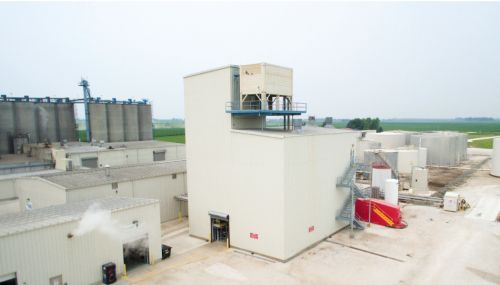All
Fossil Fuels Get a Bad Rap

No two energy companies are the same, and factors such as ownership, location and philosophy help decide the direction and fortunes of each business. Like many heating oil companies, Northboro Oil Co. is a family-owned, full-service operation that has diversified to serve changing customer needs. William Maney founded the company in 1953, and his daughter Sandra Farrell now manages the business.
 Northboro is a suburb of about 14,000 located a few miles northeast of Worcester, MA, nestled amidst other suburban towns. Natural gas is available in some portions of the Northboro marketing area, while other areas rely exclusively on deliverable fuels.
Northboro is a suburb of about 14,000 located a few miles northeast of Worcester, MA, nestled amidst other suburban towns. Natural gas is available in some portions of the Northboro marketing area, while other areas rely exclusively on deliverable fuels.
Oil & Energy recently caught up with Farrell, who was the first woman to chair the Massachusetts Oilheat Council (now the Massachusetts Energy Marketers Association). She currently serves as Secretary of the New England Fuel Institute and Co-Chair of NEFI’s Education Committee.
Oil & Energy: How do you evaluate heating oil as an energy source when compared to natural gas and heat pumps?
Sandra Farrell: I think it is the best, and right now it very competitive compared to the others. I think there are advantages in that you have a service component that also goes along with the fuel, and that is very important for customers.
I think there are a lot of customers who don’t have a problem with their heating oil. A lot of them, especially New Englanders, have been heating with oil all their lives, and they appreciate it. They like the house being warm and comfortable, and they appreciate that it isn’t going to explode.
Heating oil is an excellent fuel that has gotten a bad rap. It has become a political target, and it is very popular with anyone who wants to be seen as being “green” to bash it. Petroleum products are very pervasive in society, and I think people are way off base in that whole anti-petroleum attitude. There should probably be an education campaign about the benefits of fossil fuels.
O&E: Do people tend to overlook the benefits that fossil fuels provide in daily life?
SF: A lot of people are being very hypocritical bashing fossil fuels, as they get on a plane to fly, or they drive everywhere in their car and enjoy all those kinds of benefits. To be anti-fossil fuels seems ridiculous to me. Now when some product such as a heat pump is seen as green, people will just jump on the bandwagon. It is very popular to bash anything that is not seen as being green.
O&E: Is it unrealistic to talk about replacing fossil fuels within a few decades?
SF: We don’t really have good alternatives to petroleum. It is great to be innovative and try to conserve. It’s great to try alternative products, but certainly none are sufficient now to take over and replace the fossil fuel industry in transportation and space heating. It’s great to try and use other products if they have less impact, but these days a lot of fossil fuels don’t have the environmental impact they used to have. Even if people are getting that “cleaner fuels” message, they don’t want to get it, because fossil fuels are an easy target.
O&E: Are policymakers being unrealistic when they pass mandates to eliminate fossil fuels?
SF: Our politicians are doing a disservice not just to our industry but to anyone using fossil fuels, because they are jumping on the bandwagon of passing mandates to reduce and eliminate these valuable energy sources. It’s just stupid. Fossil fuels are not going to get eliminated. There is nothing out there to take their place. I think it is very irresponsible, and they should do a better job of educating the public that there is a place for these fuels, and they are a lot cleaner.
O&E: Do you think homeowners understand that heat pumps are ultimately powered by fossil fuels that generate the electricity?
SF: This is part of the irresponsibility or even ignorance of the younger part of the population. They seem to believe that if there isn’t a pump or a nozzle on the appliance, that it is not using fossil fuels. So a lot of people are going to heat pumps, and they are marketed as cleaner or more efficient, but ultimately the energy that is running them is created by fossil fuels. There is an ignorance in a certain segment of the population not to understand where electricity comes from, and politicians are feeding into this too and using public policy to support heat pumps.
O&E: Have the reductions in heating oil prices been helpful for Northboro Oil?
SF: I love the reduced prices, because they have made customers very happy. It is a relief to be in the office and not have customers be upset about the price. We’re not getting sarcastic comments about oil and prices. That gets old, listening to customers rant. It’s calmer and quieter now. On the other side it is very affordable for customers this year, and that’s great for us because there is not as much trouble collecting money. It feels like a win-win all around.
O&E: Is there much awareness at the customer level of cleaner fuels like ultra low sulfur heating oil and Bioheat® Fuel?
SF: I am not really sure. We send out a newsletter twice a year and try to educate the customer on these changes the industry is making, but I haven’t had customers come in and say they have read about this new fuel and they think it’s great. There is not a lot of feedback. I do try to educate them that the industry is making heating oil a cleaner product.
The attitudes are generationally based. Someone needs to start educating the younger generation that they are using fossil fuels, and those fuels are effective and clean.
O&E: Can the industry leverage ultra low sulfur heating oil and Bioheat® Fuel to improve the view that policymakers have of heating oil?
SF: I think that NEFI and other groups are trying to do that. A lot of people in the industry are trying to educate people who are in position to make policy decisions. When people sit down and listen, a lot of times they walk away with a better impression of the fuel.
O&E: Is it getting harder for a business to succeed in home comfort?
SF: I’m not sure if it is more difficult, because everyone needs home comfort in some form. In our business that is one of things we have tried to embrace: to be your go-to people that you can trust. When a homeowner needs to go to work, they can call us, and we will take care of their equipment. I think there is a strong need for home comfort, and I think a lot of people are looking for someone to take care of that for them.
A lot of young people are very work-focused, and a lot of time they want to sign up with a company that offers full service because they are not so mechanically inclined. They are looking for someone that they know will be able to take care of them if something goes wrong in the house. They just want to know that they’ll be able to have the hot water working again, so there is very much a role for companies like ours.
There will always be discount customers who are willing to take the chance of having some discomfort for a time while they shop around for someone to fix their equipment, but there are a lot of people who are not interested in that. Many customers just want to pick up the phone and give you the garage code and go on their way and know they you will get the problem fixed. That’s great for our industry and creates a lot of customer loyalty. If you can help them out when they are in a fix, they will not look around for anyone else.
There is definitely a segment of customers who understand that doing business with a company that can handle their emergencies might cost more, but it’s okay because they know that when something happens you’ll be there for them.
O&E: How is the market for your services in the Northboro area? Does a heating oil company like yours need to diversify or branch out?
SF: The market is relatively stable, but you can never sit back and relax. There are always new things coming along that people are going to want to have in their homes, and you don’t want to miss those opportunities. It’s good to diversify from heating and not rest on your laurels.
O&E: How available is natural gas in your marketing area? Has there been any expansion?
SF: We are fortunate, because it not as readily available here as in many places. We have some, but there are definitely areas where there isn’t any. Companies that have natural gas everywhere face very difficult challenges.
O&E: What are some of the important things for trade associations like Massachusetts Energy Marketers Association and New England Fuel Institute to do to help their marketer members?
SF: One of the most important things is that they are the watchdogs of our industry. They have the time and hopefully the resources – as long as we are supporting them – to be in the legislatures and in different areas where people will try to attack our industry. We count on them to be our watchdogs and protect us from all these forces that want to regulate us or bash our industry. That’s really what these organizations are all about. No one can deal with all these issues on their own, without the associations’ help.
We have always needed the associations. Back in my father’s day (Farrell’s father, William Maney, founded Northboro Oil) there were issues that were just as paramount as what we are facing today.
O&E: Is it important for individual marketers to participate in their associations?
SF: I think it is vital. My father participated in the associations, and I have always felt it is a responsibility. If you’re not going to stand up for your industry, who else is?
Related Posts
 Why Quality Matters in Your Biofuel Blends
Why Quality Matters in Your Biofuel Blends
Posted on June 25, 2025
 Incorporating Higher Blends of Biofuels
Incorporating Higher Blends of Biofuels
Posted on May 14, 2025
 NORA Programs at Eastern Energy Expo
NORA Programs at Eastern Energy Expo
Posted on May 13, 2025
 March Short-Term Energy Outlook
March Short-Term Energy Outlook
Posted on April 28, 2025
Enter your email to receive important news and article updates.
